一般过去时讲解及练习
(完整版)初中一般过去时详细讲解与练习
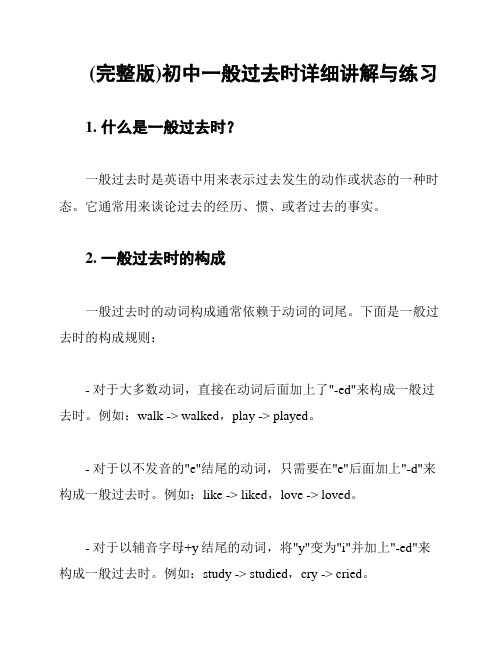
(完整版)初中一般过去时详细讲解与练习1. 什么是一般过去时?一般过去时是英语中用来表示过去发生的动作或状态的一种时态。
它通常用来谈论过去的经历、惯、或者过去的事实。
2. 一般过去时的构成一般过去时的动词构成通常依赖于动词的词尾。
下面是一般过去时的构成规则:- 对于大多数动词,直接在动词后面加上了"-ed"来构成一般过去时。
例如:walk -> walked,play -> played。
- 对于以不发音的"e"结尾的动词,只需要在"e"后面加上"-d"来构成一般过去时。
例如:like -> liked,love -> loved。
- 对于以辅音字母+y结尾的动词,将"y"变为"i"并加上"-ed"来构成一般过去时。
例如:study -> studied,cry -> cried。
- 部分动词的一般过去时需要进行不规则变化。
例如:go -> went,eat -> ate。
3. 一般过去时的用法一般过去时通常用来描述以下情况:- 过去发生的动作:I walked to school yesterday.- 过去的经历:He lived in London for five years.- 过去的事实:She was a teacher in the past.4. 一般过去时的句型练下面是一些练,帮助加深对一般过去时的理解和运用:1. 请用一般过去时填空:Yesterday, I ________ (watch) a movie at home.2. 完成句子:He _____ (visit) his grandparents last summer.3. 改写句子,使用一般过去时:I read a book yesterday. (改为否定句)4. 改写句子,使用一般过去时:They played basketball in the park. (改为疑问句)5. 总结一般过去时是用来表示过去发生的动作或状态的一种时态。
人教版八年级上册一般过去时语法讲解及练习(含答案)

一般过去时语法讲练一、含义一般过去时表示过去某个时间里发生的动作或状态;过去习惯性、经常性的动作、行为。
二、用法(一)表示过去某个时间或某一段时间发生的动作或存在的状态①平时经常的或习惯性的动作,通常用一个实义动词来描述。
She came back home after dinner yesterday.I had a word with Julia this morningHe was in Shanghai last year.They were young four years ago.(二)表示过去经常或反复发生的动作He got up at 7 every day.Mrs. Peter always carried an umbrella.常用used to/would表示过去习惯性动作:He used to visit his mother once a week.The old man would sit on a bench in the quiet park and look at others for hours without doing anything or talking to anybody.(三)有时可替代一般现在时,表达一种婉转、客气、礼貌、商量的语气Would you mind my siting here?(四)时间标志词yesterday, the day before yesterday, last week/year/summer , two/three/days/weeks ago, that morning/winter/day/year, those days/years, at that time/moment, in 1990, just now, in the old days, two hours later, one day, when I was …years old/when I was young…三、句型结构(一)be动词四、动词过去式(过去式)的变化规则(一)直接加edlisten-listened visit-visited walk-walked(二)以e结尾,直接加dlive-lived hope-hoped(三)以辅音字母加y结尾的动词,变y为i加edcarry-carried study-studied(四)以重读闭音节结尾,如末尾只有一个辅音字母,双写辅音字母加edshop-shopped stop-stopped drop-dropped plan-planned fit-fitted prefer-preferredI lived ( live )in Shanghai in 2003.(五)不规则动词过去式的变化需特殊记忆buy-bought go-went read-readI read (read) English yesterday morning.【注意事项】1、一般过去时只说明过去的事情,不强调动作对现在的影响。
初中英语语法一般过去时专项讲解及练习

初中英语语法一般过去时专项讲解及练习一般过去时是英语中常用的时态之一,用来表示发生在过去某个具体时间的动作或状态。
以下是一般过去时的用法及一些练题。
一般过去时的用法1. 表示过去某个具体时间发生的动作或状态。
- I played football yesterday.(我昨天踢了足球。
)- She was a teacher two years ago.(两年前她是一名老师。
)2. 表示过去经常性、惯性的动作或状态。
- We always went swimming in the summer.(我们夏天经常去游泳。
)- He used to live in the countryside.(他过去住在乡下。
)3. 表示过去的客观事实或真理。
- The sun rose in the east.(太阳从东方升起。
)- She knew the answer.(她知道答案。
)一般过去时练题请根据句子的意思,在括号中填上适当的动词的过去式。
1. My friend __________ (visit) me last week.(我朋友上个星期来看我。
)2. They __________ (watch) a movie yesterday evening.(他们昨晚看了一部电影。
)3. Helen and I __________ (play) tennis together when we were children.(海伦和我小时候一起打网球。
)4. He __________ (not go) to school yesterday because he was sick.(他昨天因为生病没去上学。
)5. We __________ (live) in that house for five years before we moved.(我们在那个房子住了五年才搬走。
)总结一般过去时用于表示过去某个具体时间发生的动作或状态,过去的经常性、习惯性动作或状态,以及客观事实或真理。
超详细一般过去时的全面讲解【附练习与答案】
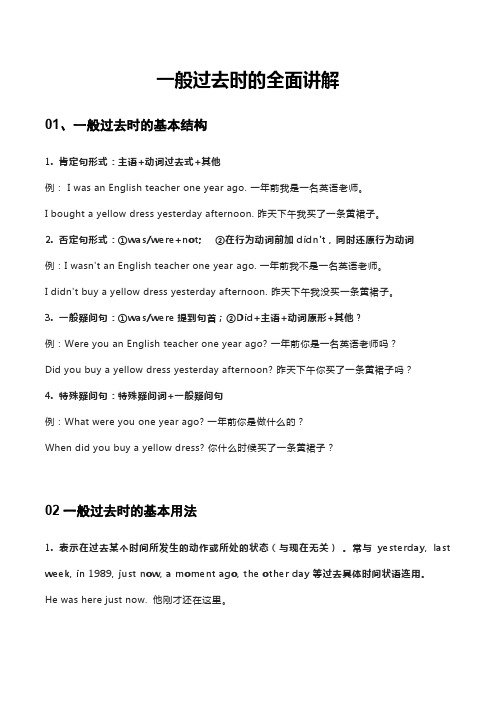
一般过去时的全面讲解01、一般过去时的基本结构1. 肯定句形式:主语+动词过去式+其他例: I was an English teacher one year ago. 一年前我是一名英语老师。
I bought a yellow dress yesterday afternoon. 昨天下午我买了一条黄裙子。
2. 否定句形式:①was/were+not; ②在行为动词前加didn't,同时还原行为动词例:I wasn't an English teacher one year ago. 一年前我不是一名英语老师。
I didn't buy a yellow dress yesterday afternoon. 昨天下午我没买一条黄裙子。
3. 一般疑问句:①was/were提到句首;②Did+主语+动词原形+其他?例:Were you an English teacher one year ago? 一年前你是一名英语老师吗?Did you buy a yellow dress yesterday afternoon? 昨天下午你买了一条黄裙子吗?4. 特殊疑问句:特殊疑问词+一般疑问句例:What were you one year ago? 一年前你是做什么的?When did you buy a yellow dress? 你什么时候买了一条黄裙子?02一般过去时的基本用法1. 表示在过去某个时间所发生的动作或所处的状态(与现在无关)。
常与yesterday, last week, in 1989, just now, a moment ago, the other day等过去具体时间状语连用。
He was here just now. 他刚才还在这里。
What did you do yesterday? 你昨天做了什么事?2. 在过去一段时间内的经常性或习惯性动作。
一般过去时的讲解与练习

一般过去时的讲解一、一般过去时的定义一般过去时表示过去某个时间发生的动作或存在的状态,一般过去时也表示过去经常或反复发生的动作,常和表示过去的时间状语连用,如:1. yesterday或以其构成的短语:yesterday morning(afternoon, evening)等;2. 由“last+一时间名词”构成的短语:last night, last year (winter, month, week)等;3. 由“时间段+ago”构成的短语:a moment ago, a short time ago, an hour ago等;4. 其它:just now等5. 由某些表示过去时态的从句等。
例:1. I phoned you last night.2. She was often late for school last term.二、一般过去时的用法1、表示过去完成的事或存在的状态,通常与表示过去的时间状语连用。
例如:I came here just now.(注意一般过去时不能与now连用,但可以与just now连用)2、表示过去经常或反复发生的事,经常与 always often usually sometimes never等时间状语连用。
例如:I always got up too late,and never had enough time for breakfast.3、表示过去特定时间一次完成的具有先后顺序的几个动作,常用过去时,此时一般不出现表示过去的时间状语,需要通过情景断定。
例如:I got up very early, washed my face,had a quick breakfast and hurried to school.4、追述过去的人或事常用过去时例如:The book was writen by Mr Liang Shiqiu.三、过去时的构成有两种1、含有be动词的一般过去时⑴am 和is在一般过去时中变为was。
(完整版)高中一般过去时详细讲解与练习
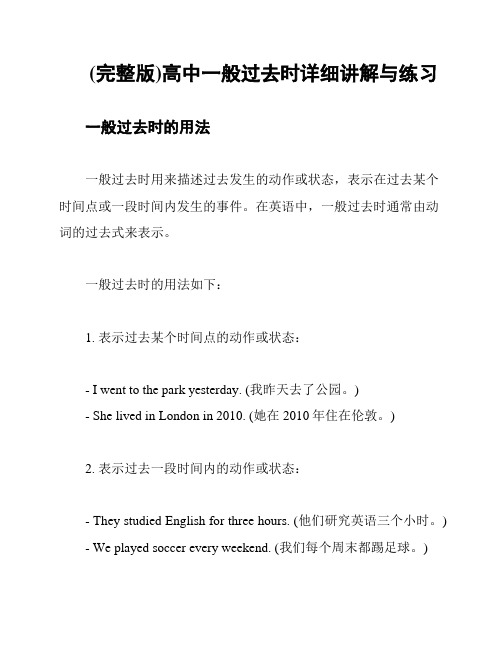
(完整版)高中一般过去时详细讲解与练习一般过去时的用法一般过去时用来描述过去发生的动作或状态,表示在过去某个时间点或一段时间内发生的事件。
在英语中,一般过去时通常由动词的过去式来表示。
一般过去时的用法如下:1. 表示过去某个时间点的动作或状态:- I went to the park yesterday. (我昨天去了公园。
)- She lived in London in 2010. (她在2010年住在伦敦。
)2. 表示过去一段时间内的动作或状态:- They studied English for three hours. (他们研究英语三个小时。
) - We played soccer every weekend. (我们每个周末都踢足球。
)一般过去时的构成一般过去时通常由动词的过去式构成。
对于大多数动词,过去式是在动词原形后加上"-ed"形成的。
但是也有一些不规则动词的过去式需要单独记忆。
一般过去时的构成如下:- 对于一般动词:动词原形 + "-ed"- 对于以不发音的"e"结尾的动词:动词原形 + "d"- 对于以辅音字母加"y"结尾的动词:去掉"y",加上"ied"- 对于不规则动词:需要单独记忆,没有统一的规则一般过去时的练以下是一些练,帮助你巩固一般过去时的用法和构成:1. 用适当的动词的过去式填空:- She __________ (buy) a new car last week.- We ___________ (visit) our grandparents yesterday.- They ___________ (play) tennis in the evening.2. 改写下列句子,使用一般过去时表达相同的意思:- I am busy now. -> I ________ busy yesterday.- They live in New York. -> They ________ in New York last year.3. 根据给定的情景填写适当的动词的过去式:- Yesterday, John ___________ (watch) a movie at home.- Last summer, we ___________ (go) to the beach for vacation.。
一般过去时详细讲解与练习

一般过去时讲解与练习一、概念:表示过去时间里发生的动作或存在的状态,或者过去习惯性、经常性的动作。
*句中一般有以下时间状语:1.时间+ago:a moment ago片刻之前;two minutes ago两分钟前;three hours ago三个小时前;fivedays ago五天前;one week ago一周前;six months ago六个月前,four years ago四年前st+时间last time上一次last night昨天晚上last week上个星期last month上个月last term 上个学期last Monday上周一last year去年3. yesterday+时间yesterday morning 昨天早上yesterday afternoon 昨天下午yesterday evening昨天晚上the day before yesterday前天the day before yesterday in the morning前天早上4. one +时间one day有一天one morning一天早上one evening一天晚上one Monday afternoon 一个星期一的下午5.其他时间状语just now刚才once upon a time很久以前in 1980在1980年时the other day 几天前at that time在那时二、基本结构:①主语+谓语(动词过去时)+句子其他成分②主语+was/were+形容词/名词/介词短语+过去时间。
三、主语+谓语(动词过去时)+句子其他成分的句型变化:1.肯定句: I worked in that hospital last year. 我去年在那家医院上班。
2.否定句: I didn’t work in that hospital last year.3.一般疑问句:Did you work in that hospital last year?4.肯定和否定回答: Yes, I did. No, I didn’t.四、主语+was/were+形容词/名词/介词短语+过去时间的句型变化1.肯定句: I was fat three years ago. 我三年前很胖。
小学英语一般过去时专项讲解、练习和参考答案

小学英语一般过去时专项讲解、练习和参考答案一般过去时专项讲解与练习一、概念:一般过去时表示过去某一时候发生的动作或存在的状态。
常与一般过去时连用的时间状语有:yesterday; 昨天just now刚才the day before yesterday;前天⋯⋯ago ⋯⋯之前(例如:三天前 three days ago )Last ⋯⋯上一个⋯(例如:上周星期天last Sunday )in 1990在1990年(in+过去时间)二、分类(一) be 动词的一般过去时:肯定句:主语 +be 动词的一般过去时( was/were)否定句:主语+be动词的一般过去时(was/were)+not一般疑问句: be 动词的一般过去时( was/were )+主语(二) there be结构的一般过去时与be 动词的一般过去时的变化基本一致。
(三)一般动词的过去时:肯定句:主语 +动词的过去时( I laughed.)否定句:主语 +did not+ 动词原形( I didn’t laugh.)一般疑问句: Did+主语 +动词原形( Did you laugh?)三.巧记 chant动词一般过去时,表示过去发生事;be 用 was 或用 were, have,has变had;谓语动词过去式,过去时间坐标志;一般动词加 -ed ,若是特殊得硬记。
否定句很简单,主语之后didn ’ t 添;疑问句也不难, did 放在主语前;如果谓语之前有 did ,谓语动词需还原;动词若是 was,were, 否定就把 not 添。
四、习题练习(一)用动词的适当形式填空:1.He ______ (work) in that bank four years ago.2.She ______ (live) in the US last Monday.3.I ______ (see) him yesterday.4.He _______(come) to school at 6 o’clock this morning.5.The boy _______ (have) a bad cold yesterday.6.When _______ you _______ (buy) that house?7.He _______(tell) a story to his daughter yesterday.8._____ you ____ (try) to call me last night?9.What _______you _______ (buy) in the shop?I ______ (buy) a coat just now.10. The doctor ______ (get) up late this morning.11.She ________ (paint) the wall last month.12.My mother _______ (be) a worker 20 years ago.13.________ (be) you here just now?No, I ________ (be not) here.14.Why _______ your brother _______ (cry) last night?15.It ______(be) my mother’s birthday yesterday.(二)翻译下列句子:1.我上周去看爷爷和奶奶了。
七年级英语一般过去时讲解与练习
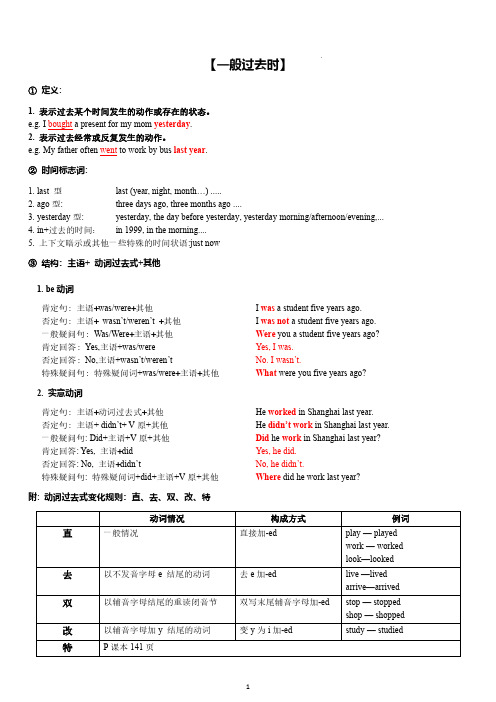
【一般过去时】①定义:1.表示过去某个时间发生的动作或存在的状态。
e.g.I bought a present for my mom yesterday.2.表示过去经常或反复发生的动作。
e.g.My father often went to work by bus last year.②时间标志词:st型last(year,night,month…).....2.ago型:three days ago,three months ago....3.yesterday型:yesterday,the day before yesterday,yesterday morning/afternoon/evening,...4.in+过去的时间:in1999,in the morning....5.上下文暗示或其他一些特殊的时间状语:just now③结构:主语+动词过去式+其他1.be动词肯定句:主语+was/were+其他I was a student five years ago.否定句:主语+wasn’t/weren’t+其他I was not a student five years ago.一般疑问句:Was/Were+主语+其他Were you a student five years ago?肯定回答:Yes,主语+was/were Yes,I was.否定回答:No,主语+wasn’t/weren’t No.I wasn’t.特殊疑问句:特殊疑问词+was/were+主语+其他What were you five years ago?2.实意动词肯定句:主语+动词过去式+其他He worked in Shanghai last year.否定句:主语+didn’t+V原+其他He didn’t work in Shanghai last year.一般疑问句:Did+主语+V原+其他Did he work in Shanghai last year?肯定回答:Yes,主语+did Yes,he did.否定回答:No,主语+didn’t No,he didn’t.特殊疑问句:特殊疑问词+did+主语+V原+其他Where did he work last year?附:动词过去式变化规则:直、去、双、改、特动词情况构成方式例词直一般情况直接加-ed play—playedwork—workedlook—looked 去以不发音字母e结尾的动词去e加-ed live—livedarrive—arrived 双以辅音字母结尾的重读闭音节双写末尾辅音字母加-ed stop—stoppedshop—shopped 改以辅音字母加y结尾的动词变y为i加-ed study—studied特P课本141页★即时即练I.写出下列动词的过去式和中文意思1.ride__________________2.feed__________________3.talk__________________4.do___________________5.grow__________________6.learn__________________7.pick__________________8.are__________________9.eat__________________ 10.study_________________11.see__________________12.take_________________ 13.buy__________________14.sleep_________________15.get__________________ 16.meet_________________17.watch_________________18.live__________________ 19.go________________20.dance________________21.write________________ II.句型转换1.Lucy did her homework at home.(改为否定句)Lucy________________her homework at home.2.His father worked all day last Monday.(改为一般疑问句)________his father________all day last Monday?3.I was very busy yesterday.(改为否定句)I________________very busy yesterday.4.There was some orange in the cup.()________there________orange in the cup?5.They went to the movies last Saturday.(对划线部分提问)________________they________last weekend?把下列句子改为否定句、一般疑问句并作肯定、否定回答1.My trip last weekend was excellent.2.The stars were so beautiful at night.3.The farmer showed Carol around the farm.4.We asked him some questions.III.用括号内所给单词的适当形式填空1.Mary and Tom________________(come)to China last month.2.Mike________________(not go)to bed until12o’clock,so he________________(get)up late.3.My cousin________________(read)English book in the living room now.4.I often________________(call)Mike in the morning.5.Tom________________(begin)to learn Chinese last year.6.She________________(visit)the country two years ago.7.The man________________(write)the book in2005.8.She________________(go)into the room because she________________(forget)her key9.I________________(wash)the clothes and________________(clean)the room.10.My mother________________(go)shopping yesterday.11.He________________(be)busy last Sunday,but you________________(be)free.IV.Grammar Focus1.—你学校的旅行怎么样?—太棒啦!________________________________________________________________________________________________? ________________________________________________________________________________________________!2.—你去过动物园了吗?—没有,我去了农场。
语法大全之一般过去时及专项练习题(答案)
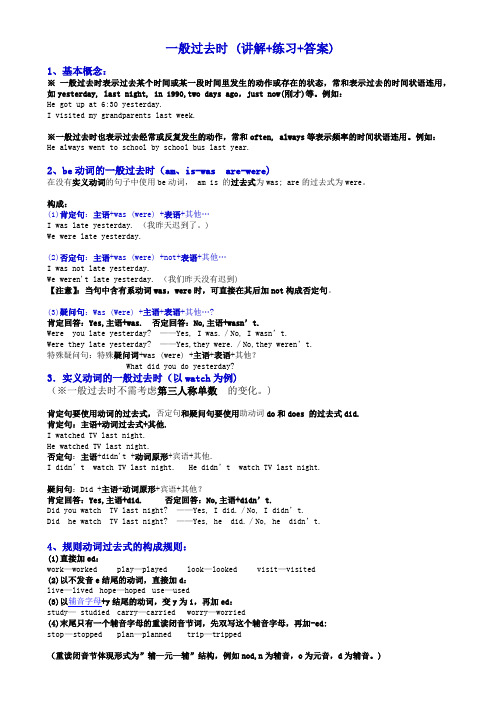
一般过去时 (讲解+练习+答案)1、基本概念:※ 一般过去时表示过去某个时间或某一段时间里发生的动作或存在的状态,常和表示过去的时间状语连用,如yesterday, last night, in 1990,two days ago,just now(刚才)等。
例如:He got up at 6:30 yesterday.I visited my grandparents last week.※一般过去时也表示过去经常或反复发生的动作,常和often, always等表示频率的时间状语连用。
例如:He always went to school by school bus last year.2、be动词的一般过去时(am、is-was are-were)在没有实义动词的句子中使用be动词, am is 的过去式为was; are的过去式为were。
构成:(1)肯定句:主语+was (were) +表语+其他…I was late yesterday. (我昨天迟到了。
)We were late yesterday.(2)否定句:主语+was (were) +not+表语+其他…I was not late yesterday.We weren't late yesterday. (我们昨天没有迟到)【注意】:当句中含有系动词was,were时,可直接在其后加not构成否定句。
(3)疑问句:Was (Were) +主语+表语+其他…?肯定回答:Yes,主语+was. 否定回答:No,主语+wasn’t.Were you late yesterday? ——Yes, I was./No, I wasn’t.Were they late yesterday? ——Yes,they were./No,they weren’t.特殊疑问句:特殊疑问词+was (were) +主语+表语+其他?What did you do yesterday?3.实义动词的一般过去时(以watch为例)(※一般过去时不需考虑第三人称单数的变化。
小学英语过去式讲解(附练习及答案)
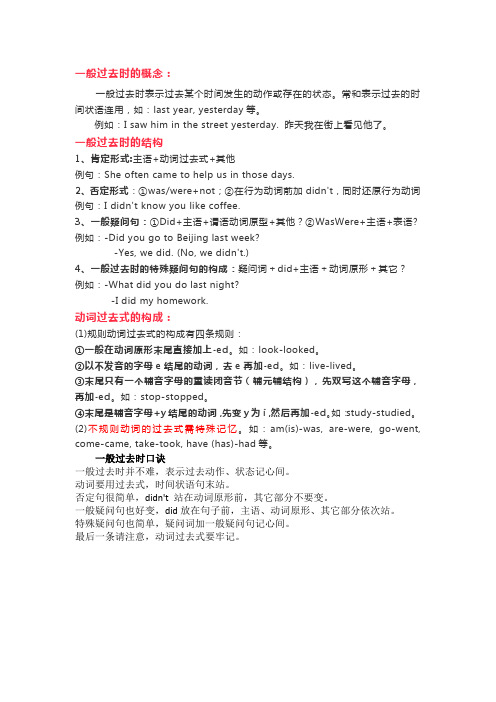
一般过去时的概念:一般过去时表示过去某个时间发生的动作或存在的状态。
常和表示过去的时间状语连用,如:last year, yesterday等。
例如:I saw him in the street yesterday. 昨天我在街上看见他了。
一般过去时的结构1、肯定形式:主语+动词过去式+其他例句:She often came to help us in those days.2、否定形式:①was/were+not;②在行为动词前加didn't,同时还原行为动词例句:I didn't know you like coffee.3、一般疑问句:①Did+主语+谓语动词原型+其他?②WasWere+主语+表语?例如:-Did you go to Beijing last week?-Yes, we did. (No, we didn't.)4、一般过去时的特殊疑问句的构成:疑问词+did+主语+动词原形+其它?例如:-What did you do last night?-I did my homework.动词过去式的构成:(1)规则动词过去式的构成有四条规则:①一般在动词原形末尾直接加上-ed。
如:look-looked。
②以不发音的字母e结尾的动词,去e再加-ed。
如:live-lived。
③末尾只有一个辅音字母的重读闭音节(辅元辅结构),先双写这个辅音字母,再加-ed。
如:stop-stopped。
④末尾是辅音字母+y结尾的动词,先变y为i,然后再加-ed。
如:study-studied。
(2)不规则动词的过去式需特殊记忆。
如:am(is)-was, are-were, go-went, come-came, take-took, have (has)-had等。
一般过去时口诀一般过去时并不难,表示过去动作、状态记心间。
动词要用过去式,时间状语句末站。
否定句很简单,didn't 站在动词原形前,其它部分不要变。
一般过去时基本结构及练习

一般过去时一、一般过去时概述一般过去时表示过去某个时间里发生的动作或状态;过去习惯性、经常性的动作、行为;过去主语所具备的能力和性格,如:We went back to the park with Andy. 我们和安迪回到公园What did you eat yesterday你昨天吃了些什么二、一般过去时的构成及用法(1)它的结构一般为:主语+谓语(动词过去式)+句子其他成分;主语+was/were+形容词/名词/介词短语+过去时间;否定形式:①was/were+ not; ②在行为动词前加didn't,同时还原行为动词;一般疑问句: ①Did+主语+do+其他;②Was/Were+主语+其他,如:He travelled around over 80 countries by bicycle.他骑着自行车环游了大概80多个国家。
Myschooltripwasgreat.我的学校郊游棒极了。
Nancy wasn’t happy last Friday. 上星期五南希不高兴。
I didn't know you like coffee.我不知道你喜欢咖啡。
Didyougotothebeach你们去海滩了吗—Yes,wedid./No,wedidn’t.是的,我们去了。
/不,我们没有。
WasyourweekendOK你的周末过得还行吧—Yes,itwas./No,itwasn’t.是的,还行。
/不,不行。
1.【2015年南京市中考英语试卷】--Why didn’t Peter______ his homework -- He said he hadlost hisworkbook. I think it’s an excuse.A.doesB. doingC. doD. did 【答案】C【解析】试题分析:句意:——为什么彼得没有做他的家庭作业——他说他弄丢了他的作业本,我认为这是个借口。
(完整版)一般过去时讲解及练习
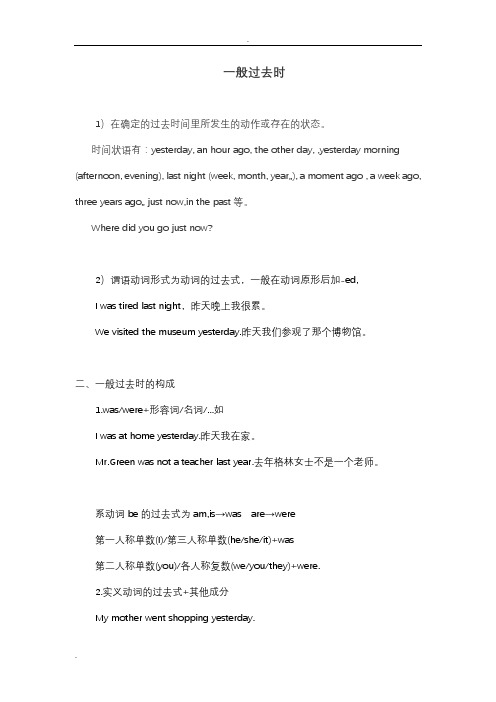
一般过去时1)在确定的过去时间里所发生的动作或存在的状态。
时间状语有:yesterday, an hour ago, the other day, ,yesterday morning (afternoon, evening), last night (week, month, year…), a moment ago , a week ago, three years ago… just now,in the past等。
Where did you go just now?2)谓语动词形式为动词的过去式,一般在动词原形后加-ed,I was tired last night,昨天晚上我很累。
We visited the museum yesterday.昨天我们参观了那个博物馆。
二、一般过去时的构成1.was/were+形容词/名词/...如I was at home yesterday.昨天我在家。
Mr.Green was not a teacher last year.去年格林女士不是一个老师。
系动词be的过去式为am,is→was are→were第一人称单数(I)/第三人称单数(he/she/it)+was第二人称单数(you)/各人称复数(we/you/they)+were.2.实义动词的过去式+其他成分My mother went shopping yesterday.我妈妈昨天去购物了。
His uncle worked in Beijing in 2014.他叔叔2014年在北京工作。
三、一般过去时的句式四、动词过去式的变化规则3 used toused to + do:"过去常常"表示过去习惯性的动作或状态,但如今已不存在。
Mother used to take a walk. (过去常常散步)二、构成及变化1. Be动词在一般过去时中的变化:am 和is在一般过去时中变为was。
(完整版)中考时态专题一般过去时详细讲解及练习
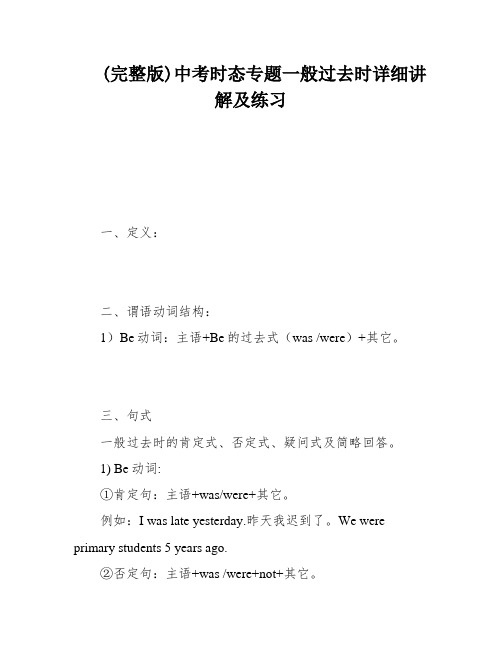
(完整版)中考时态专题一般过去时详细讲解及练习一、定义:二、谓语动词结构:1)Be动词:主语+Be的过去式(was /were)+其它。
三、句式一般过去时的肯定式、否定式、疑问式及简略回答。
1) Be动词:①肯定句:主语+was/were+其它。
例如:I was late yesterday.昨天我迟到了。
We were primary students 5 years ago.②否定句:主语+was /were+not+其它。
例如:___(我们昨天没迟到)③一般疑问句:be动词提前。
Was/Were+主语+其它?例如:I was ___(改一般疑问句) →Were you ill yesterday?(你昨天病了吗?)肯定回答:Yes, I was. (是的,我病了。
)否定回答:No, I wasn't. (不,我没病。
)④特殊疑问句:对谓语动词进行提问的:疑问词+was/were+主语+其它(一般疑问句)?2) 实义动词:①肯定句:主语+V-ed+其它。
例如:I called up my good friend just now.②否定句:主语+didn’t+V原形+其它。
例如:I didn’t argue with Tom last week.③一般疑问句:Did+主语+V原形+其它?例如:___ 2010. (改一般疑问句) →Did you buy a souvenir in 2010?肯定回答:Yes, I did.否定回答:No, I didn’t.④特殊疑问句:疑问词+did+主语+V原形+其它?例如:When did you buy the book?(你是什么时候买的这本书?)Finally, let's fill in the blanks with the correct form of the verb. "Was" should be used for the first blank, "played" for the second, "went" for the third, and "read" for the fourth.5. Tom was upset because he had failed the English test again.6. We moved to Beijing 8 years ago.1. C2. C3. B4. A5. C6. A7. B8. ATom was ___ down because he had failed his English test once again. It had e a recurring problem for him. Eight years ago,my family and I relocated to Beijing. This morning, I asked my friend what time she had arrived at school.1. What did they have for breakfast last week?2. ___?3. Jim ___ she was ___.4. They were not late the day before yesterday.5. Where did you go?6. Did Wei Fang have a good time last summer n? Yes, she did. / No, she didn't.7. Li Hong did not do her ___.8. How did Mr Gao go to work last year?9. Is there tea in the cup?1. Did Wei Fang have a good time last summer n? Yes, she did. / No, she didn't.2. Li Hong did not do her ___.3. How did Mr Gao go to work last year?4. Is there tea in the cup?。
四种过去时态讲解及习题总结

四种过去时态的讲解及习题(一)一般过去时一、一般过去时1.一般过去时表示过去某个时间发生的动作或存在的状态,常和表示过去的时间状语连用。
一般过去时也表示过去经常或反复发生的动作。
2.Be动词在一般过去时中的变化:⑴am 和is在一般过去时中变为was。
(was not=wasn't)⑵are在一般过去时中变为were。
(were not=weren't)⑶带有was或were的句子,其否定、疑问的变化和is, am, are一样,即否定句在was或were后加not,一般疑问句把was或were调到句首。
3.句中没有be动词的一般过去时的句子否定句:didn't +动词原形,如:Jim went home yesterday.Jim didn't go home yesterday.一般疑问句:在句首加did,句子中的动词过去式变回原形。
如:Jim went home yesterday.Did Jim go home yesterday?特殊疑问句:⑴疑问词+一般疑问句?如:Jim went home yesterday.Did Jim go home yesterday?What did Jim do yesterday?动词过去式变化规则:1.一般在动词末尾加-ed,如:pull-pulled, cook-cooked2.结尾是e加d,如:taste-tasted3.末尾是辅音字母加一个元音字母和一个辅音字母的重读闭音节,应双写末尾的辅音字母,再加-ed,如:stop-stopped4.以“辅音字母+y”结尾的,变y为i,再加-ed,如:study-studied5.不规则动词过去式:一般过去时练习Be动词的过去时练习(1)一、用be动词的适当形式填空1.I _______ at school just now.2.He ________ at the camp last week.3.We ________ students two years ago.4.They ________ on the farm a moment ago.5.Yang Ling ________ eleven years old last year.6.There ________ an apple on the plate yesterday.7.There ________ some milk in the fridge on Sunday.8.The mobile phone _______ on the sofa yesterday evening.二、句型转换1. It was exciting.否定句:________________________________________________ 一般疑问句:____________________________________________ 肯、否定回答:__________________________________________ 2. All the students were very excited.否定句:________________________________________________ 一般疑问句:____________________________________________ 肯、否定回答:__________________________________________ 3. They were in his pocket.否定句:________________________________________________ 一般疑问句:____________________________________________ 肯、否定回答:__________________________________________ Be动词的过去时练习(2)一、用be动词的适当形式填空1.I ______ an English teacher now.2.She _______ happy yesterday.3.They _______ glad to see each other last month.4.Helen and Nancy ________ good friends.5.The little dog _______ two years old this year.6.Look, there ________ lots of grapes here.7.There ________ a sign on the chair on Monday..8.Today _______ the second of June. Yesterday ______ the first of June. It _____ Children's Day. All the students ______ very excited.二、句型转换1. There was a car in front of the house just now.否定句:________________________________________________一般疑问句:____________________________________________肯、否定回答:__________________________________________肯、否定回答:__________________________________________三、中译英1. 我的故事书刚才还在手表旁边。
一般过去时讲解以及练习

第二课一、一般过去式的定义:一般过去时表示过去某个时间发生的动作或存在的状态。
常和表示过去的时间状语连用,如:last year, yesterday等,也可以表示过去经常反复发生的动作,常和often, always等频率副词连用。
二、表示过去的时间:yesterday 昨天the day before yesterday前天ago 以前in 1980 在1980年in the past 过去just now 刚才the other day 前几天 a few days ago 几天前at the age of 10 在10岁时(过去年龄段)in the old days 在过去的岁月里at that moment在那时last year 去年last week 上周三、一般过去式的构成1.be动词的过去式是was与were。
肯定句:I was a teacher.He/she was a student.You/we/they were workers.You were a worker.It was a cat.否定句:I was not a teacher.He/she was not a student.You/we/they were not workers.You were not a worker.It was not a cat.一般疑问句:Was I a teacher?Was she/he a teacher?Were we/you/they students?Were you a student?巩固练习:用be动词的适当形式填空。
1.I_____at school just now.2.He_____at the camp last week.3.We ____students two years ago.4.They _____on the farm a moment ago.5.Li Yang _____eleven years old last year.6.The mobile phone______on the sofa yesterday evening.7.There______ an apple on the plate yesterday.8.You____ ill yesterday.9.I ____a student 2 years ago.10.T ina and Tom _____workers 5 years ago.改写句子:1.Joy was in Grade One last year.否定句:___________________________________一般疑问句:_________________________________肯定回答:____________________________________ 否定回答:____________________________________ 2.Lily was in Qingdao yesterday.否定句:_____________________________________一般疑问句:____________________________________ 肯定回答:____________________________________ 否定回答:___________________________________ 3.The twins were in a primary school last term否定句:_____________________________________一般疑问句:____________________________________ 肯定回答:____________________________________ 否定回答:___________________________________ 4.I was at home the day before yesterday.否定句:_____________________________________一般疑问句:____________________________________ 肯定回答:____________________________________ 否定回答:___________________________________ 5.Tina and Tom were students 5 years ago.否定句:_____________________________________一般疑问句:____________________________________肯定回答:____________________________________否定回答:___________________________________单项选择:( )1.My father ________ill yesterday.A.isn't B.aren't C.wasn't D.weren't( )2.______your parents at home last week﹖A.Is B.Was C.Are D.Were( )3.The twins ______in Dalian last year.They ______here now.A.are; were B.were; are C.was; are D.were; was ( )4.________your father at work the day _______yesterday(前天)﹖A.Was; before B.Is; before C.Was; after D.Is; after( )5.—Who was on duty last Friday﹖—______.A.I am B.I was C.Yes, I was D.No, I wasn't 四、其他实义动词的一般过去式构成规则动词的过去式:1.一般情况下在动词原形后直接加-ed。
- 1、下载文档前请自行甄别文档内容的完整性,平台不提供额外的编辑、内容补充、找答案等附加服务。
- 2、"仅部分预览"的文档,不可在线预览部分如存在完整性等问题,可反馈申请退款(可完整预览的文档不适用该条件!)。
- 3、如文档侵犯您的权益,请联系客服反馈,我们会尽快为您处理(人工客服工作时间:9:00-18:30)。
一般过去时讲解及练习一、单项选择一般过去时1.I ______ in Hangzhou for many years, but now I live in Beijing.A.have lived B.live C.had lived D.lived【答案】D【解析】考察时态。
本题是与后面的now形成呼应关系,使用过去时。
本题容易受for many years 影响,会错选A项。
2.Not until he went through real hardship _____the love we have for our families is important. A.had he realized B.did he realize C.he realized D.he had realized 【答案】B【解析】考查部分倒装句和时态。
not until这样的否定词放在句首的时候,后面的主句是部分倒装,就是将be动词,助动词或情态动词放在主语前面,而且这句话的从句是过去时,主句的动作发生在从句的动作前面,不可能是过去完成时,用一般过去时。
句意:直到他经历了真正的困难,他才意识到我们对家庭的爱是很重要的。
选B。
【考点定位】考查部分倒装句和时态3.Mary cleverly met the customer’s requirements that you ___________ to deal with, so she won the competition.A.failed B.failC.may fail D.must fail【答案】A【解析】考查动词时态。
句意:玛丽巧妙地满足了你没能应付的客户的要求,所以她赢得了比赛。
根据句意可知句子用一般过去时态,故答案为A。
4.—Where was I?—You ________ you didn’t like your job.A.had said B.saidC.were saying D.has said【答案】B【解析】考查动词的时态。
句意:——我说到哪里?——你说到你不喜欢你的工作。
结合语境可知,下文描述的是过去的刚刚发生的动作,故用过去时态。
选B。
5.Hardly ______ when the bus suddenly pulled away.A.they had got to the bus stop B.they got to the bus stopC.did they get to the bus stop D.had they got to the bus stop【答案】D【解析】【分析】【详解】考查倒装句。
句意:他们一到站点公共汽车就突然开走了。
否定副词hardly放于句首构成倒装句。
Hardly + had +主语 +done when...did...是固定的句式。
故选D。
6.---- Have you ever been to Provence which is home to lavender(薰衣草) in Paris?---- Yes, only once. I ________ there for a week.A.had stayed B.were staying C.have stayed D.stayed【答案】D【解析】【详解】考查时态。
句意:—你去过巴黎薰衣草的故乡普罗旺斯吗?—是的,只有一次。
我在那里呆了一个星期。
此处是指过去发生的一件事,与现在无关,所以用一般过去时态,故答案为D。
7.—How long _____each other before they _____here?—For about a year.A.have they known, come B.did they know, cameC.do they know, come D.had they known, came【答案】D【解析】【详解】考查时态。
句意:—他们来这儿之前认识多久了?—大约一年了。
根据句意分析,他们来到这里是过去的事,他们互相了解大约一年的时间肯定发生在来这里之前,发生在过去某一动作之前的动作,应该使用过去完成时。
故D选项正确。
8. I wonder what makes him a good English teacher.He ________ as a volunteer in the UK for two years, which helps him with his work a lot. A.has served B.serves C.had served D.served【答案】D【解析】【详解】考查时态。
句意:——我不知道是什么使他成为一个好的英语老师。
——他在英国做了两年的志愿者,这对他的工作帮助很大。
这里指在过去某段时间内发生过的事,在陈述一件过去的事实,所以用一般过去时态,故答案为D。
9.Don't give up half way, and you will find the scenery is more beautiful when you reach thedestination than when you _______.A.start off B.have started offC.started off D.will start off【答案】C【解析】【详解】考查时态。
句意:不要半途而废,当你到达目的地的时候,你会发现风景比你出发的时候更美。
根据句意可知,start off发生在reach the destination之前,应该用一般过去时,故C 项正确。
10.—What do you think of the Great Wall of China?—Splendid! When I was in Beijing, I ________ it twice.A.had visited B.visitedC.have visited D.would visit【答案】B【解析】【详解】考查时态。
句意:——你认为中国的长城怎么样?——好极了!在北京的时候我参观过两次。
根据“When I was in Beijing”可知,此处用一般过去时,故B项正确。
11.—What do you think of the movie?—It’s fantastic. The only pity is that I ________ the beginning of it.A.missed B.had missed C.miss D.would miss【答案】A【解析】考查动词时态。
从创设的语境来看电影已演完,句意“唯一的遗憾是错过了开头”说话者在陈述过去事实,构成现在和过去的对比,选A。
12.John ________ in the United States for decades, but in the last years he has already adapted to living in China.A.was living B.had livedC.has lived D.Lived【答案】D【解析】【详解】考查动词时态。
句意:约翰在美国生活了很多年,但在最近这几年中他已经适应了在中国的生活。
根据 living in China可知约翰现在在中国居住,再结合in the United States 中时间状语for decades可知是过去的事情,故选D项。
13.-Late again!Where_____________?-Sorry,I________________ in the heavy traffic,or I would have been here earlier.A.were you;have got stuck B.have you been;have got stuckC.were you;got stuck D.have you been;got stuck【答案】D【解析】【详解】考查时态。
句意:——又迟到了?你去哪了?——对不起,我遇上交通拥挤了,否则我就会早点到。
第一空根据语境“又迟到了”可知,已经回来了,所以用现在完成时态,第二空:短语be/get stuck in 被困住,动作发生在过去所以用一般过去式,故选D。
14.—Mary will not attend the party tonight.—But she she would!A.has promised B.promisedC.will promise D.promises【答案】B【解析】考查动词的时态。
——玛丽今晚不参加聚会。
——但是她许诺她将会来。
根据上文Mary will not attend the party tonight.可知,“promise”这一动作发生在过去,主语she与promise是主动关系。
故选B。
15.Jack had planned to visit his grandparents last weekend, but an emergency _____ and he had to reschedule.A.should come up B.had come up C.came up D.would come up 【答案】C【解析】【详解】考查时态。
句意:杰克原计划上周末去看望他的祖父母,但突然发生了一件紧急事情,他不得不重新安排时间。
由“he had to reschedule”可知,and连接的两个句子都为一般过去时。
故选C项。
16.The famous reporter, who is said to have gone back to America last year, _____in China for almost twenty years.A.lived B.was living C.has lived D.had lived【答案】A【解析】考查时态题。
根据who引导的定语从句可知,该记者已经回到了美国,可知住在中国20年,是过去的事情。
故用A.17.When seeing a stone in front of the car, _____.A.the car stopped B.the car was stoppedC.the driver stopped the car D.the car was stopping【答案】C【解析】考查分词装状语的逻辑主语。
当分词做状语的时候,其逻辑主语是句子的主语。
本句seeing的逻辑主语就应该是句子的主语,故C正确。
